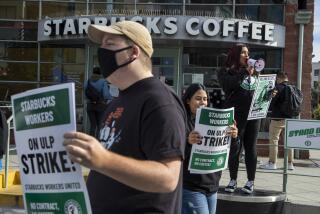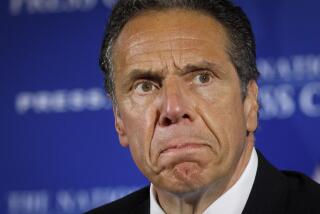THE JUDICIARY : Free-Speech Issues Crowd Docket : Supreme Court tries to draw a line between First Amendment rights and limits. Two rulings define government role. Six more suits are pending.
- Share via
WASHINGTON — This term of the Supreme Court is shaping up to be an unusually busy one for cases involving the First Amendment. In the first half of this year, the justices will hand down eight rulings on free-speech claims.
Constitutional scholars are watching especially closely two cases that involve conflicts between religion and free speech.
The amendment says the government shall enforce “no law respecting an establishment of religion, or prohibiting the free exercise thereof, or abridging the freedom of the speech or of the press.”
But what happens if someone wants to use government money or property to express his religious faith? Is that free speech or establishment of religion?
Two of the cases were decided last week.
By an 8-1 vote, the court ruled that Amtrak and other government-funded corporations must abide by the terms of the First Amendment. This ruling, Lebron vs. Amtrak, 93-1525, could prove significant as government shifts more of its traditional duties to corporate entities.
The case arose when Michael Lebron, a billboard artist, contracted to display his work in New York’s Penn Station.
But Amtrak balked when it learned he planned to mock the conservative leanings of the Coors beer family with a sign that asked, “Is it the Right’s Beer Now?”
Amtrak, which operates the station, said it would not allow “political” advertisements, and a U.S. appeals court said the train corporation could not be sued under the First Amendment because it was essentially private, not public.
However, the high court said a corporation that receives federal funds and is governed by presidential appointees must be treated as part of the government.
In a second ruling affecting nearly 2 million federal employees, the court struck down part of a 1989 law that barred civilian workers from receiving money for giving speeches or writing articles during their free time on topics unrelated to their jobs.
This “crudely crafted” measure began as a way to stop lawmakers from taking extra payments, the court said, but it went too far by restricting the free-speech rights of ordinary employees.
The case was U.S. vs. National Treasury Workers Union, 93-1170.
Here is the lineup for the remaining cases:
ANONYMOUS LEAFLETS: Can the government force sponsors of political leaflets and mailers to reveal their names in the interest of full disclosure, or does the First Amendment give them a right to speak anonymously?
The Ohio courts upheld a $100 fine against a woman who handed out a leaflet at a school board meeting because she did not include her name, but her lawyer says such laws violate her free-speech rights.
The case of McIntyre vs. Ohio, 93-986, was heard in October.
BEER LABELS: Ever wondered why you can’t find the alcohol content on a beer bottle? That is because Congress, trying to stop “strength wars” among brewers, passed a law in 1935 barring beer makers from disclosing or advertising this information. States may override this law, but most don’t. Coors says this measure violates its free-speech rights.
Apparently the Colorado brewer was concerned about its product’s image as a “weak beer,” and it wants to tell its customers that its beer has roughly the same alcohol content, 4% to 5% by volume, as all the others.
The case of Bentsen vs. Adolph Coors, 93-1631, was heard in November.
AMBULANCE CHASERS: Can a state prohibit eager lawyers from sending letters to accident victims until at least 31 days after the incident? A Florida law firm, Went for It, Inc., challenged this as a free-speech violation, and a federal court agreed.
The case of Florida Bar vs. McHenry, 94-226, was heard in January.
CHRISTIAN STUDENTS: The University of Virginia supports student clubs and pays the costs of their publications. But in 1991, the campus refused to pay for a Christian students’ magazine on the grounds that it was explicitly religious.
A U.S. appeals court agreed and said the First Amendment did not allow the use of government funds to promote religion. The students say this violates their free-speech rights.
The case of Rosenberger vs. University of Virginia, 94-329, will be heard Wednesday.
PARADE: Can the war veterans of South Boston exclude gays from their St. Patrick’s Day parade? Parades are usually deemed to be an act of free speech, giving organizers the right to convey their own messages. But a Massachusetts court said the exclusion of gays violated the state’s civil rights law.
The case of Hurley vs. Irish-American Gays, 94-749, will be heard in April.
CROSS IN THE SQUARE: If the state allows Christian groups to place crosses in the public square across from the Ohio state Capitol, does that amount to an “establishment of religion”?
A state judge said the crosses were protected as an act of free speech, but Ohio’s attorney general said prominent symbols on public property appeared to promote religion.
The case of Capitol Square vs. Pinette, 94-780, will be heard in April.
More to Read
Sign up for Essential California
The most important California stories and recommendations in your inbox every morning.
You may occasionally receive promotional content from the Los Angeles Times.











